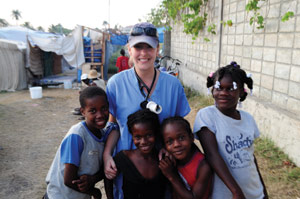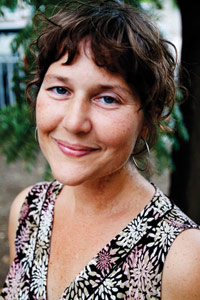Six weeks after a massive earthquake in Haiti killed an estimated 200,000 people and left another 1.2 million homeless, the devastated Caribbean nation is desperately trying to cope.

Meanwhile, 1,300 miles away in Asheville, the catastrophe struck a chord, inspiring area residents to reach out in a variety of ways. A local nurse has launched a tarp-and-tent drive. A former UNCA student who now lives in Haiti is campaigning for Haitian-led rebuilding efforts. And the head of a small Asheville nonprofit is teaming up with another group to help set up a birthing clinic in Haiti.
What sets these ventures apart from other relief work is a shared focus on grass-roots recovery.
Local nurse collecting tarps, tents for earthquake victims
A USA Today story launched Jessica Hardy into action.
Recently graduated from A-B Tech's nursing program, the newly minted RN was waiting to start her job at Mission Hospital, so she knew she had some time. And the motivation was simple.
"This is exactly why I got into nursing," she explains. "I want to provide health care in disaster areas, in Third World countries."
So Hardy hooked up with 14 other medical professionals not affiliated with any group, who flew to the Dominican Republic and caught a Cessna flight to Port-au-Prince. From there, the Haitian military escorted them to their final destination — the coastal town of Leogane, about an hour outside the city. Hardy says there wasn't much time during the drive to comprehend what she was seeing: giant piles of broken concrete, leaning concrete slabs held up only by power lines, and shell-shocked people "just standing there, not knowing how to proceed."
There, the magnitude of the disaster began to sink in. The relief workers set up an operating room and a labor-and-delivery room, where Hardy worked alongside Japanese and Sri Lankan medical professionals. The group also created mobile medical units, using trucks to ferry local nursing students to outlying areas. Hardy's team saw about 1,500 people per week at the Leogane center, treating broken bones and grisly wounds and battling death.
"Sometimes you help and you donate, and you don't have the opportunity to see where your efforts go," she notes. "Here, we could honestly say we made a huge difference." The Haitian people, she says, met the relief workers with "a lot of gratitude, a lot of hugs, a lot of hand-holding — and a lot of tears."
The around-the-clock schedule took its toll at the time, but the emotional impact didn't hit Hardy until later. That's when she decided to continue seeking ways to help. With the rainy season looming, Hardy says it's critical to get people into more effective shelter than bed sheets propped up with sticks.
"With the rains and the winds, we're looking at a second wave of death and disease," she explains. "We've put all this effort into saving lives, but there will continue to be illness. Sanitation is an issue, so bacterial infections could be out of control. Air quality is poor. So if these people are out in the wet and the wind, they just won't have a chance. If we can provide them a way to get out of the weather, we can save their lives."
Hardy is asking people to dig through their garage or basement and consider donating old tents, tarps or other weather-resistant materials. The Nantahala Outdoor Center, REI, Black Dome, Craggie Brewing Co. and Terra Nostra Decor have all agreed to serve as drop-off points for donated items.
"I don't have any expectations," says Hardy. "One tent is going to help; 100 tents is going to be great. This is a great community, and people want to help."

To help spread the word, Hardy plans to create a Facebook page. Contact her at coverhaiti@hotmail.com.
Empowering locals
Standing atop a desert mountain near Anse Rouge, Amber Munger felt the earthquake and knew what would happen next. Millions of dollars' worth of aid would come pouring in and, with it, hundreds of outsiders who would create budgets and action plans and checklists. Good relief work would get done, she believed, but it wouldn't necessarily reflect local residents' needs or desires.
The way the United Nations and other large relief organizations have responded, says Munger, "is to build the same Haiti that's been there — and that Haiti has never worked for Haitians." These groups, she maintains, "understand relief, but they don't understand Haiti."
The former Asheville resident first visited the island nation in 1997 and has been living there the past several years. When the earthquake hit, she was with a group of students, talking about a reforestation project.
Munger doesn't want to lay blame, but she does want to see relief workers employ a strategy that's more in line with what she's been doing for years: supporting grass-roots Haitian groups that were already doing the hard work they know must be done. In its simplest terms, Munger's strategy is to get Haitians trained and in the right positions now so they can take over the recovery and direct it as they see fit.
Local groups have already tackled such issues as empowering women, initiating sustainable agricultural practices and establishing community-based health care, notes Munger. "They have all of the solutions to their own problems. They just don't have the resources to implement them."
In a sense, the earthquake has wiped the slate clean, leaving Haiti free to develop the way its people want it to — in small towns supported by sustainable agriculture and enjoying a high quality of life — rather than a model imposed from outside, she says. Accordingly, Munger is working with local community leaders who are "already building the social fabric" the country needs. They just need to be trusted and met with respect, rather than confronted with an outsider's paternalistic attitude, she says.
So what can Asheville residents do to help? Munger suggests supporting groups such as Beyond Borders, whose budget for the embattled country is actually approved by Haitians, or the Association of Popular Educators of Ainse Rouge, the group Munger works with to help give local women a voice. During a Feb. 23 talk to about 50 UNCA students, Munger also suggested that Asheville develop a sister-city type relationship with Anse Rouge that could benefit both partners.
"In any way you can directly support Haitians," she urges, "do it."
Small is beautiful
Aaron Funk aims to be a one-man support team in Haiti — work he says he was meant to do.
Funk, who is executive director of the Asheville-based American Rainbow Rapid Response, will help another nonprofit, Yayasan Bumi Sehat, set up infrastructure for a field hospital in Jacmel, Haiti.
"I feel like all my experience on a personal level has me going to exactly where I need to be going to help," he said in a Feb. 24 phone interview, shortly before boarding a plane for Haiti.
Funk's nonprofit, which was started in the wake of Hurricane Katrina, provides meals to disaster victims. Yayasan Bumi Sehat, headquartered in Bali, offers reproductive, maternal and child health care to displaced people. In Jacmel, the group plans to operate a birthing clinic and children's hospital.
One of Funk's board members was on his way to Haiti when he connected with a woman from Yayasan Bumi Sehat who, it turned out, was also a friend of Funk's family.
In Haiti, Funk's logistical work will boost the village-based outreach of Yayasan Bumi Sehat, the kind of small group that can be overlooked in a big disaster, he says.
"Donate to grass-roots organizations," advises Funk. "They're run by real people, not large organizations. The larger organizations do good work and help a lot of people, but don't forget the little guys, because we do a lot of good stuff too."



Jason,great article. I’ll catch up with you when back in Asheville